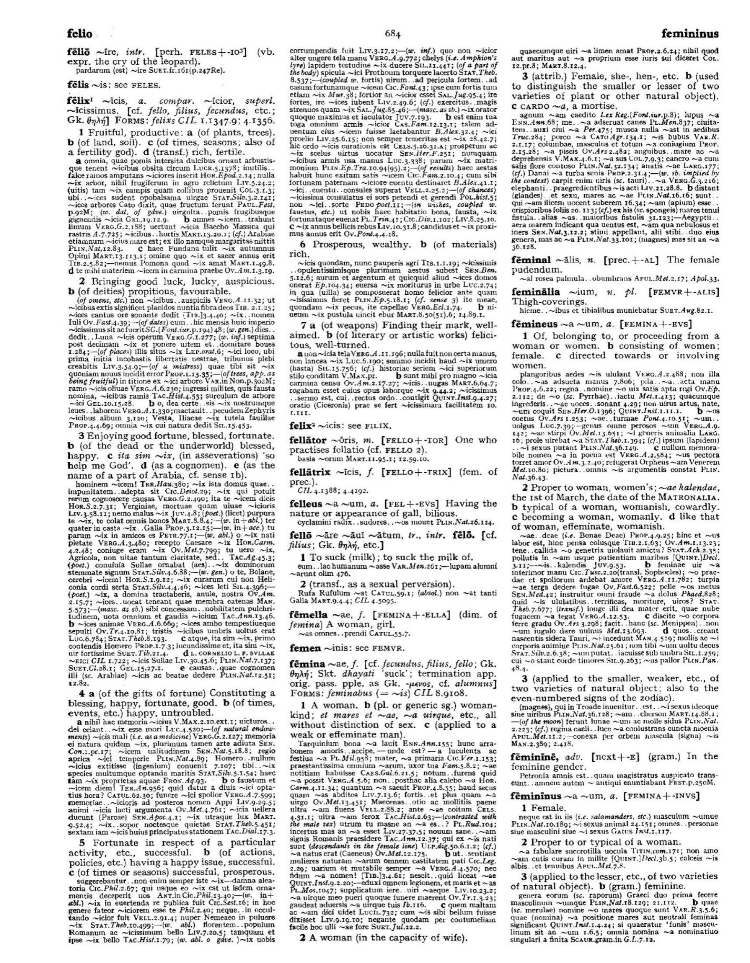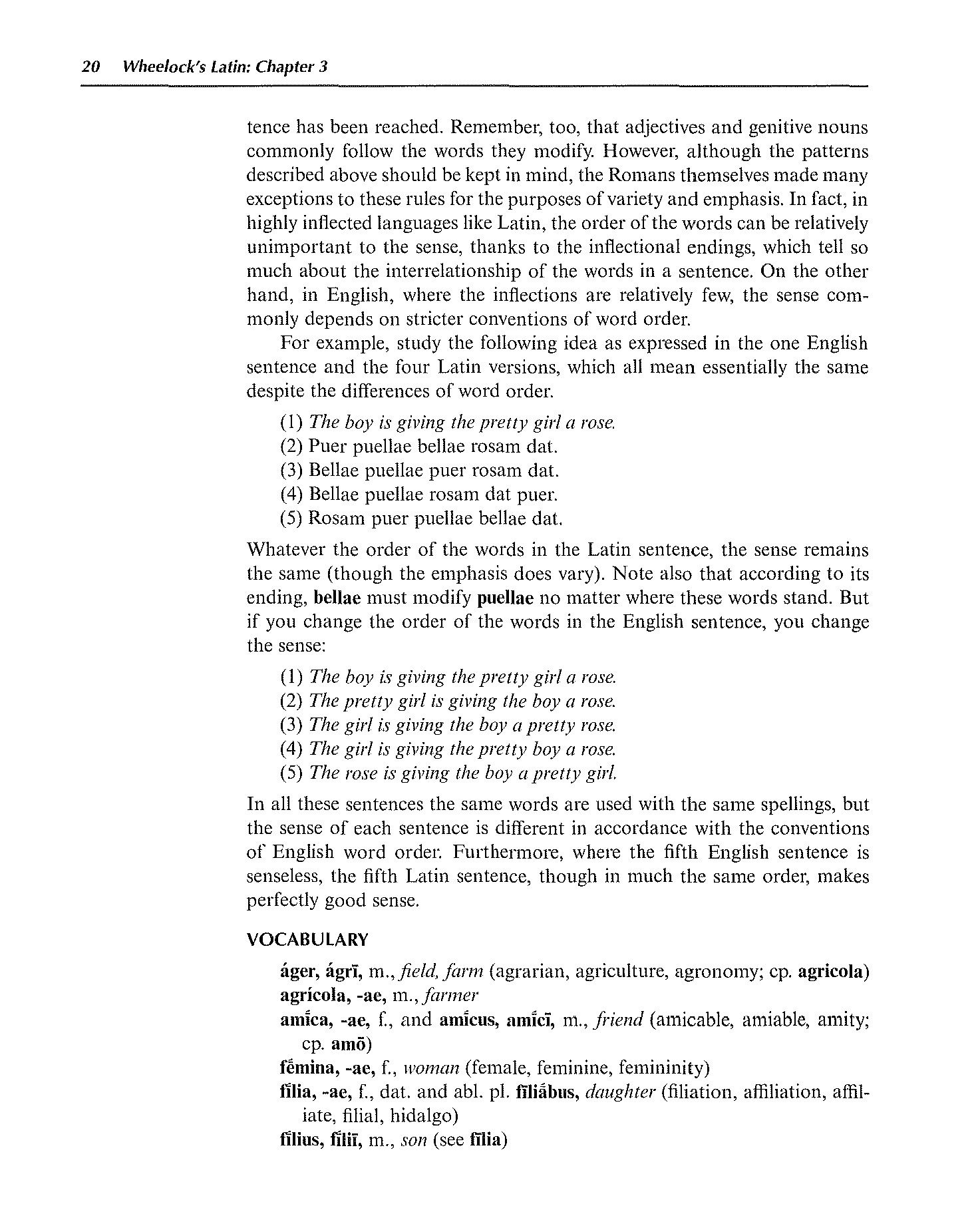
page_listing.tpl
page_subListingDetails.tpl
sub_listingDetails_style1.tpl
sub_listingDetails.title.tpl
fēmina woman
fēmina is a Latin Noun that primarily means woman.
Definitions for fēmina
Wheelock's Latin
Noun
- 1
woman
English derivatives:
female feminine femininity
Oxford Latin Dictionary
Noun
- 1
A woman. (b) (pl. or generic sg.) womankind; all without distinction of sex. (c) (applied to a weak or effeminate man).
- 2
A woman (in the capacity of wife).
- 3
(attrib) Female, she-, hen-, etc. (b) (used to distinguish the smaller or lesser of two varieties of plant or other natural object).
Sentences with fēmina
Latin to English
Fēmina dē sē cōgitābat. Compare The woman was thinking about herself.
Fēmina scrīpsīt litterās amicis suīs.Compare The woman wrote a letter to her (own) friends.
Fuit fēmina maximā virtūte et fidē atque simillima mātrī.Compare She was a woman of the greatest courage and loyalty and in fact very like her mother.
Dux fēmina factī.Compare A woman (was) leader of the action.
Audeant illī virī et fēminae esse fortēs.Compare Let those men and women dare to be brave.
Nōlī timēre nē omnēs virī et fēminae magnōrum animōrum Rōmā discēdant.Compare Do not fear that all the men and women of great courage will depart from Rome.
A crudele genus nec fidum femina nomen! a pereat, didicit fallere si qua virum.Compare O cruel, faithless race of women! May they perish who have learned to betray a husband.
Sed vobis facile est verba et componere fraudes: hoc unum didicit femina semper opus.Compare But it is easy for you to contrive lies and wiles: this art every woman has learned well.
Declension table for fēmina
Cactus2000
| Singular | Plural | |
| Nom. | fēmina | fēminae |
| Gen. | fēminae | fēminārum |
| Dat. | fēminae | fēminīs |
| Acc. | fēminam | fēminās |
| Abl. | fēminā | fēminīs |
Data sources
Notes
- Definitions
- Frederick M. Wheelock, Wheelock's Latin, 6th ed., rev. Richard A. LaFleur (New York, NY: HarperCollins Publishers, 2005): 20.
- P. G. W. Glare, Oxford Latin Dictionary, Vols. 1-8 (Oxford: Clarendon Press, 1982): 684.
- Word frequencies
- Christopher Francese, "Latin Core Vocabulary," Dickinson College Commentaries, last modified 2014, http://dcc.dickinson.edu.
- Paul B. Diederich, The Frequency of Latin Words and Their Endings, PhD diss., (Columbia University, 1939).
- Louis Delatte, Suzanne Govaerts, Joseph Denooz, and Etienne Evrard, Dictionnaire fréquentiel et index inverse de la langue latine [Frequency Dictionary and Inverse Index of the Latin Language] (Liège, Belgium: Laboratoire d'analyse statistique des langues anciennes de l'Université de Liège [L.A.S.L.A.], 1981): 122.
Bibliography
Allen, Joseph H. Allen and Greenough's New Latin Grammar for Schools and Colleges: Founded on Comparative Grammar. Edited by James B. Greenough, George L. Kittredge, Albert A. Howard, and Benjamin L. D'Ooge. Boston, MA: Ginn & Company, 1903.
Crystal, David. A Dictionary of Linguistics and Phonetics. 6th ed. Oxford, UK: Blackwell Publishing, 2008.
Delatte, Louis, Suzanne Govaerts, Joseph Denooz, and Etienne Evrard. Dictionnaire fréquentiel et index inverse de la langue latine [Frequency Dictionary and Inverse Index of the Latin Language]. Liège, Belgium: Laboratoire d'analyse statistique des langues anciennes de l'Université de Liège (L.A.S.L.A.), 1981.
Diederich, Paul B. The Frequency of Latin Words and Their Endings. PhD diss., Columbia University, 1939.
Francese, Christopher. "Latin Core Vocabulary." Dickinson College Commentaries. Last modified 2014. http://dcc.dickinson.edu/latin-vocabulary-list.
Gildersleeve, Basil L., and Gonzales Lodge. Gildersleeve's Latin Grammar: Third Edition, Revised, and Enlarged. 3rd ed. London, England: Macmillan and Co., 1903.
Glare, Peter G.W. Oxford Latin Dictionary. Vols. 1-8. Oxford, England: Clarendon Press, 1982.
Krüger, Bernd. "Latin Conjugation Tables." Cactus2000. Accessed May 5, 2023. https://latin.cactus2000.de/index.en.php.
Pierson, Nick. "Sound of Text." Accessed October 26, 2019. https://soundoftext.com.
Wheelock, Frederick M. Wheelock's Latin. 6th ed. Revised by Richard A. LaFleur. New York, NY: HarperCollins Publishers, 2005.
Wiktionary Contributors. "Victionarium." Wikimedia Foundation, Inc. Updated March 18, 2019. https://la.wiktionary.org/wiki/Victionarium:Pagina_prima.
Citation
Chicago (17th ed.)
Allo Contributors. "fēmina, fēminae (n.) - Latin Word Definition." Allo Latin Dictionary. Last modified . Accessed February 19, 2026. http://ancientlanguages.org/latin/dictionary/femina-feminae.
Entry created on . Last updated on .







